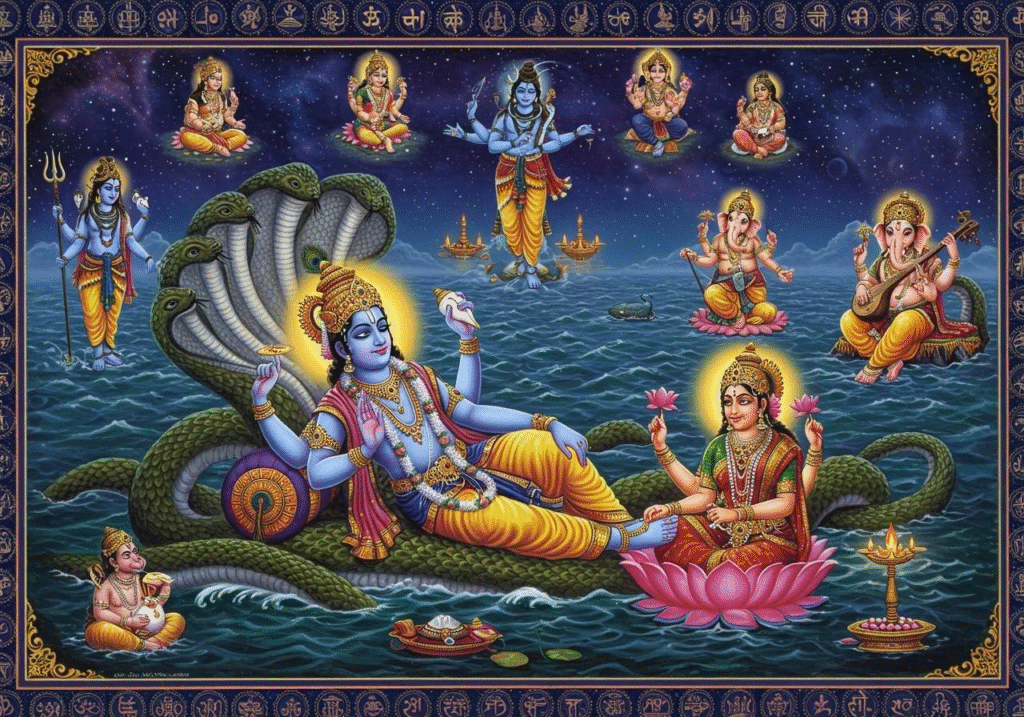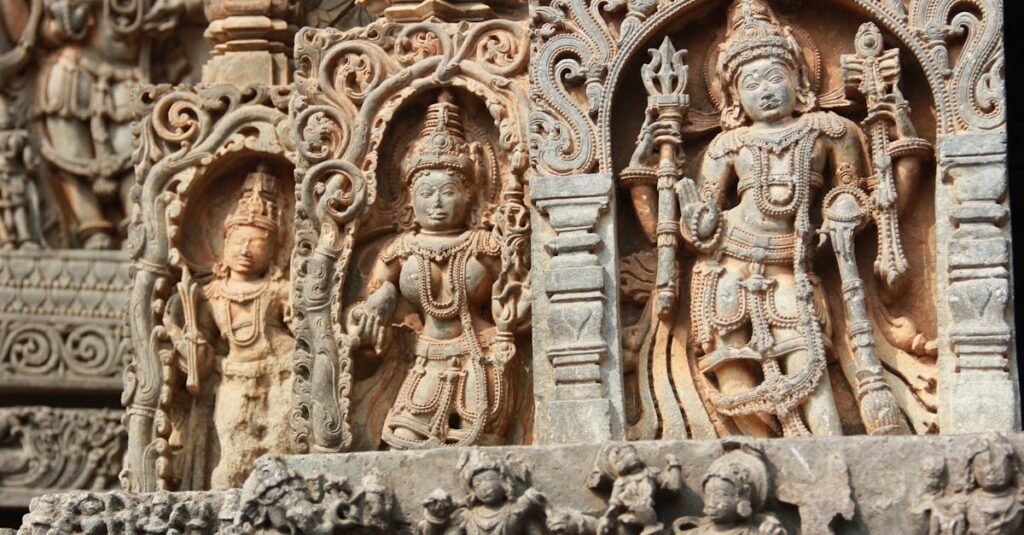Indian Mythology and Its Influence on Culture, Art, and Religion 🕉️✨

Indian mythology is a vast and deeply rooted part of India’s culture and history, influencing not just religion but also the country’s art, literature, traditions, and even modern-day practices. From the Vedas to the Mahabharata and the Ramayana, the stories of gods, goddesses, heroes, and demons have shaped the moral and cultural fabric of Indian society. In this post, we’ll explore Indian mythology’s profound influence on culture, art, and religion, and how it continues to resonate even today.
The Heart of Indian Mythology: Gods, Goddesses, and Cosmic Stories 🌺

At the core of Indian mythology are the stories of deities and their divine actions. These ancient tales reflect not just spiritual truths, but also moral lessons that have shaped the ethical compass of generations.
Major Deities in Indian Mythology
- Brahma, Vishnu, and Shiva: The Trimurti represents the three primary aspects of existence—creation (Brahma), preservation (Vishnu), and destruction (Shiva). Together, they form the cycle of life, death, and rebirth in the cosmos.
- Durga and Lakshmi: Durga, the warrior goddess, represents strength, while Lakshmi symbolizes wealth and prosperity, both of which have a significant role in Indian worship and festivals.
- Ganesha: Known for his elephant head, Ganesha is the remover of obstacles and is widely worshipped across the country.
The Influence of Indian Mythology on Culture 🏛️
Indian mythology deeply impacts Indian culture, from festivals to rituals and social values. Here’s how:
Festivals 🎉
Many of India’s major festivals are rooted in mythological tales. The celebration of Diwali, for instance, marks the victory of Lord Rama over the demon king Ravana, symbolizing the triumph of good over evil. Holi, the festival of colors, celebrates the love story of Radha and Krishna. These celebrations bring to life the themes and characters of Indian mythology and help perpetuate them across generations.
Moral Stories & Traditions 📖

From childhood, Indian mythology teaches moral lessons about dharma (duty), karma (action), and moksha (liberation). Myths like the Mahabharata instill values of honor, sacrifice, and justice, while stories of Krishna’s childhood offer lessons in playfulness, devotion, and spirituality. These stories are passed down orally and through books, influencing how Indian people perceive life, relationships, and ethics.
Indian Mythology’s Influence on Art and Literature 🎨📚
Indian mythology has had a huge impact on the arts, inspiring a diverse range of artistic expression, including sculpture, paintings, dance, and literature.
Visual Arts 🎭

Indian mythology has been immortalized in paintings, sculptures, and murals for centuries. The famous Ajanta and Ellora caves in Maharashtra showcase intricate murals depicting scenes from the Ramayana and Mahabharata. Artists often use mythological themes to convey divine power, human emotion, and the supernatural world.
- Temple Art: The magnificent stone carvings of gods and goddesses on temples such as the Kailasa Temple at Ellora are iconic examples of the artistic legacy influenced by mythology.
Literature & Poetry ✍️

The Mahabharata, Ramayana, Bhagavad Gita, and the Vedas form the foundation of much of Indian literature. These epic texts have been retold countless times in local languages and modern interpretations, making them a continuous source of inspiration for poets, novelists, and playwrights.
- Contemporary Works: Modern writers like Chetan Bhagat and Amish Tripathi have taken inspiration from Indian mythology, creating contemporary novels rooted in ancient legends.
Performing Arts 🎶
Indian classical dance forms like Bharatanatyam, Kathak, and Kathakali are often based on mythological tales. Through expressive hand gestures (mudras) and storytelling through movement, dancers and performers bring these ancient stories to life, allowing the audience to witness the rich mythology in action.
Indian Mythology’s Role in Religion ⛪🛕

Indian mythology plays a central role in the religious practices and beliefs of the subcontinent, particularly in Hinduism, the most widely practiced religion in India.
Rituals and Worship 🙏
The depiction of deities from Indian mythology is central to Hindu rituals and pujas (prayers). Temples across India house shrines dedicated to gods like Vishnu, Shiva, and Durga, and their mythological stories influence the prayers, offerings, and celebrations that occur during religious festivals.
Spiritual Philosophy 🧘♂️

The teachings of Indian mythology, especially through texts like the Bhagavad Gita, provide a philosophical foundation for life’s purpose. Concepts like karma, dharma, and moksha directly stem from these stories, providing a guide for how one should live a righteous life and attain liberation from the cycle of birth and rebirth.
The Global Influence of Indian Mythology 🌍

While deeply rooted in India, Indian mythology has transcended national boundaries and influenced global culture, especially in the fields of art, literature, and spirituality.
- Yoga and Meditation: Modern spiritual practices like yoga and meditation are influenced by ancient Hindu texts and stories, making Indian mythology a spiritual guide for millions worldwide.
- Hollywood & Popular Culture: Movies, TV shows, and books in Western media often draw on themes of good versus evil, divine intervention, and heroism, all of which are integral to Indian mythology.
Conclusion 🌿
Indian mythology is more than just a collection of stories; it’s a living, breathing influence that shapes religion, culture, and art in profound ways. From the epic tales of the gods to timeless festivals and rituals, these myths continue to inspire and guide generations across the world. Whether in paintings, literature, or rituals, the myths of ancient India continue to offer wisdom, beauty, and a deep connection to the spiritual realm.
Indian mythology is a powerful testament to the richness and diversity of human culture, and its impact on art, literature, and religion will endure for millennia to come.
#IndianMythology #HinduMythology #IndianGods #Ramayana #Mahabharata #IndianArt #IndianCulture #ReligiousMyths #MythologyInArt#anslation #carrerbook

